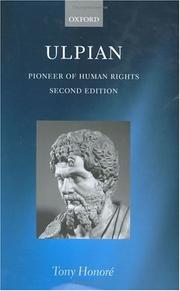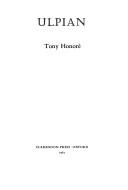| Listing 1 - 5 of 5 |
Sort by
|
Book
Year: 1824 Publisher: Goettingae : apud Vandenhoeck et Ruprecht,
Abstract | Keywords | Export | Availability | Bookmark
 Loading...
Loading...Choose an application
- Reference Manager
- EndNote
- RefWorks (Direct export to RefWorks)
Latin language --- Gaius --- Ulpian

ISBN: 0199244243 9780199244249 Year: 2002 Publisher: Oxford Oxford university press
Abstract | Keywords | Export | Availability | Bookmark
 Loading...
Loading...Choose an application
- Reference Manager
- EndNote
- RefWorks (Direct export to RefWorks)
Human rights --- Ulpian --- Roman law --- History --- -Civil law --- Civil law (Roman law) --- Law --- Law, Roman --- Civil law --- Ulpianus, Domitius --- -History --- Ulpianus, Domitius, --- Domitius Ulpianus, --- Ulpian, --- Ulpiano, --- Ulpiano, Domitio, --- Ulpiano, Domizio, --- Ulpien, --- Roman law - History - Sources.
Book
ISBN: 0191705217 1280446595 142376742X 9780191705212 Year: 2002 Publisher: Oxford : Oxford University Press,
Abstract | Keywords | Export | Availability | Bookmark
 Loading...
Loading...Choose an application
- Reference Manager
- EndNote
- RefWorks (Direct export to RefWorks)
This is a new edition of the work on the most influential lawyer of all time, the Syrian Ulpian. He wrote a massive survey of Roman law in 213-17 AD & Tony Honoré argues that his philosophy of freedom & equality make him a pioneer of human rights.
Roman law --- Droit romain --- Law - Europe, except U.K. --- Law - Non-U.S. --- Law, Politics & Government --- History --- Histoire. --- Ulpianus, Domitius, --- Ulpian. --- Ulpianus, --- Civil law --- Civil law (Roman law) --- Law --- Law, Roman --- Domitius Ulpianus, --- Ulpian, --- Ulpiano, --- Ulpiano, Domitio, --- Ulpiano, Domizio, --- Ulpien,

ISBN: 0198253583 9780198253587 Year: 1982 Publisher: Oxford Clarendon
Abstract | Keywords | Export | Availability | Bookmark
 Loading...
Loading...Choose an application
- Reference Manager
- EndNote
- RefWorks (Direct export to RefWorks)
Roman law --- Droit romain --- History --- Histoire --- Ulpian --- -34 <37> --- Civil law --- Civil law (Roman law) --- Law --- Law, Roman --- Romeins recht --(algemeen-voor verdere onderafdelingen z.o:{341 <37>}; {342 <37>}; {343 <37>};{347.1 <37>}; {?347.2 <37>: 347.6 <37>}; {347.62 <37>} --- History. --- 34 <37> Romeins recht --(algemeen-voor verdere onderafdelingen z.o:{341 <37>}; {342 <37>}; {343 <37>};{347.1 <37>}; {?347.2 <37>: 347.6 <37>}; {347.62 <37>} --- 34 <37> --- Ulpianus, Domitius, --- Domitius Ulpianus, --- Ulpian, --- Ulpiano, --- Ulpiano, Domitio, --- Ulpiano, Domizio, --- Ulpien, --- Roman law - History --- Ulpien, Domitius Ulpianus
Book
ISBN: 0691244154 Year: 1994 Publisher: Princeton, New Jersey : Princeton University Press,
Abstract | Keywords | Export | Availability | Bookmark
 Loading...
Loading...Choose an application
- Reference Manager
- EndNote
- RefWorks (Direct export to RefWorks)
Few sources reveal the life of the ancient Romans as vividly as do the houses preserved by the eruption of Vesuvius. Wealthy Romans lavished resources on shaping their surroundings to impress their crowds of visitors. The fashions they set were taken up and imitated by ordinary citizens. In this illustrated book, Andrew Wallace-Hadrill explores the rich potential of the houses of Pompeii and Herculaneum to offer new insights into Roman social life. Exposing misconceptions derived from contemporary culture, he shows the close interconnection of spheres we take as discrete: public and private, family and outsiders, work and leisure. Combining archaeological evidence with Roman texts and comparative material from other cultures, Wallace-Hadrill raises a range of new questions. How did the organization of space and the use of decoration help to structure social encounters between owner and visitor, man and woman, master and slave? What sort of "households" did the inhabitants of the Roman house form? How did the world of work relate to that of entertainment and leisure? How widely did the luxuries of the rich spread among the houses of craftsmen and shopkeepers? Through analysis of the remains of over two hundred houses, Wallace-Hadrill reveals the remarkably dynamic social environment of early imperial Italy, and the vital part that houses came to play in defining what it meant "to live as a Roman."
Material culture --- Architecture, Domestic --- Architecture, Domestic --- Material culture --- Herculaneum (Extinct city) --- Herculaneum (Extinct city) --- Pompeii (Extinct city) --- Pompeii (Extinct city) --- Buildings, structures, etc. --- Social life and customs. --- Buildings, structures, etc. --- Social life and customs. --- Abdication. --- Aedicula. --- Alleius Nigidius Maius. --- Allusion. --- Ancillae. --- Antechamber. --- Apartment. --- Archetype. --- Architectural plan. --- Aristocracy. --- Art group. --- Author. --- Biography. --- Building. --- Cabinetry. --- City-state. --- Civil society. --- Clothing. --- Commius. --- Consideration. --- Contemporary society. --- Count. --- Credential. --- Cultural capital. --- Cultural history. --- Designer. --- Dowry. --- Dwelling. --- Dynasty. --- Economy. --- Edward Gorey. --- Ephesus. --- Etiquette. --- Exedra. --- Extended family. --- Floriculture. --- Freedman. --- Herculaneum. --- House plan. --- House. --- Household. --- Housing. --- Infrastructure. --- Insula (building). --- Interior design. --- Legatee. --- Literature. --- Living Space. --- Lodging. --- Magnificence (history of ideas). --- Mattress. --- Nobility. --- Occupancy. --- Opus sectile. --- Osteria. --- Ostia (Rome). --- Ownership. --- Parlour. --- Pergamon. --- Periodical literature. --- Peristyle. --- Pinacotheca. --- Political economy. --- Pompeii. --- Population density. --- Portico. --- Poster. --- Preservationist. --- Promiscuity. --- Pronoun. --- Proportion (architecture). --- Publication. --- Quartile. --- Residence. --- Residential area. --- Ruler. --- Show house. --- Social class. --- Social integration. --- Social position. --- Social relation. --- Social science. --- Social status. --- Society. --- Sociology. --- Studio apartment. --- Taberna. --- Tablinum. --- Tacitus. --- Tenement. --- Tibullus. --- Triclinium. --- Trimalchio. --- Ulpian. --- Usage. --- Vault (architecture). --- Vestibule (architecture). --- Vitruvius. --- Wallpaper. --- Workforce.
| Listing 1 - 5 of 5 |
Sort by
|

 Search
Search Feedback
Feedback About UniCat
About UniCat  Help
Help News
News